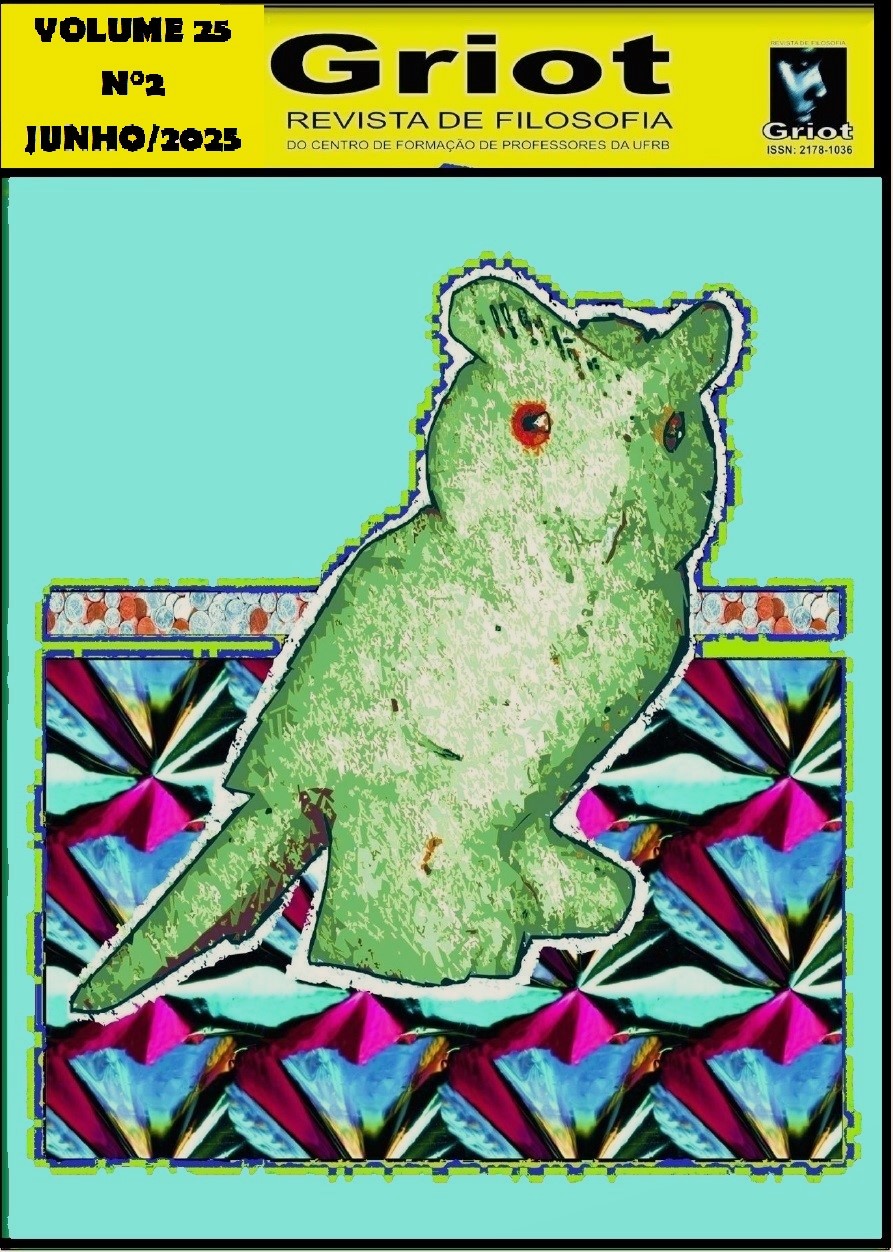The post human of transhumanism
DOI:
https://doi.org/10.31977/grirfi.v25i2.5322Keywords:
Transhumanism; Science; Technology; Post-humanism.Abstract
This article intends to introduce the cultural and philosophical movement known as transhumanism, exploring its philosophy in order to explain its ideal of human transcendence, since this movement envisions the possibility of the human species transcending itself through science and technology – aiming for the post-human. To this purpose, it will be shown that transhumanism and post-humanism can very well be considered together as one and viewed in the following matter: post-humanism is the point at which transhumanism with the intention of human enhancement, taken to its ultimate consequences, will achieve.
Downloads
References
ALIGHIERI, Dante. A divina comédia. São Paulo: Abril Cultural, 1979.
BOSTROM, Nick. The transhumanist FAQ. World Transhumanist Association. Version 2.1, p. 1-56, 2003. Disponível em: <https://nickbostrom.com/views/transhumanist.pdf>. Acesso em: 01/01/2025.
BOSTROM, Nick. Transhumanist values. Philosophy documentation center, p. 3-14, 2005a. Disponível em: <https://nickbostrom.com/ethics/values.pdf>. Acesso em: 01/01/2025.
BOSTROM, Nick. A history of transhumanist thought. Journal of evolution and technology, vol. 14, n. 1, p. 1-30, 2005b. Disponível em: <https://nickbostrom.com/papers/history.pdf>. Acesso em: 01/01/2025.
BOSTROM, Nick. “Why I Want to be a Posthuman When I Grow Up”. In: Medical Enhancement and Posthumanity, eds. Bert Gordijn and Ruth Chadwick. Springer, 2008: pp. 107-137. Disponível em: <https://nickbostrom.com/posthuman.pdf>. Acesso em: 01/01/2025.
CONDORCET, Jean-Antoine-Nicolas de Caritat. Esboço de um quadro histórico dos progressos do espírito humano. Campinas, SP: Ed. da UNICAMP, 2013.
DARWIN, Charles. A origem das espécies. Rio de Janeiro: Ediouro, 1987.
ESFANDIARY, F. M. Are you a transhuman?: monitoring and stimulating your personal rate of growth in a rapidly changing world. New York: Warner Books, 1989.
FERRY, L. A revolução transumanista. Tradução de Éric R. R. Heneault. Barueri, SP: Manole, 2018.
FERRANDO, Francesca. Philosophical posthumanism, Bloomsbury Academic, 2019.
FERNANDES, Rafael Martins & NETO, Luiz Maria de Barros Coelho. O ser humano no transumanismo: elementos ético-antropológicos para um diálogo com a proposta cristã. Encontros Teológicos, Florianópolis, v. 35, n. 3, p. 627-646, 2020.
FRANCO, Edgar Silveira. O Manifesto da Arte Extropiana e a obra PRIMO 3M+: Proposta para um Corpo Pós-Humano. Disponível em: <https://proceedings.science/compos/compos-2003/trabalhos/o-manifesto-da-arte-extropiana-e-a-obra-primo-3m-plus-proposta-para-um-corpo-pos?lang=pt-br>. Acesso em: 01/01/2025.
HUXLEY, Julian. Religion without revelation. New York: New American Library, 1957.
HARAWAY, Donna. “Manifesto Ciborgue: ciência, tecnologia e feminismo-socialista no final do século XX”. In: TADEU, Tomaz. Antropologia do ciborgue: as vertigens do pós-humano. Tradução de Tomaz Tadeu. Belo Horizonte: Autêntica Editora, 2009.
HAMMES, Erico. Transumanismo e pós-humanismo: uma aproximação ético-teológica. Perspectiva Teológica, Belo Horizonte, v. 50, n. 3, p. 431-452, 2018.
KURZWEIL, Ray. A era das máquinas espirituais. Tradução de Fábio Fernandes. São Paulo: Aleph, 2007. Disponível em: < file:///C:/Users/sopho/Downloads/Ray%20Kurzweil%20-%20A%20Era%20das%20M%C3%A1quinas%20Espirituais.pdf>. Acesso em: 01/01/2025.
KURZWEIL, Ray. A singularidade está próxima: quando os humanos transcendem a biologia. Tradução de Ana Goldberger. São Paulo: Itaú Cultural: Iluminuras, 2018.
MORE, M. Principles of Extropy. Version 3.11 © 2003. Disponível em: < https://web.archive.org/web/20131015142449/http://extropy.org/principles.htm>. Acesso em: 01/01/2025.
MORE, M; VITA-MORE, Natasha. The transhumanist reader: classical and contemporary essays on the science, technology, and philosophy of the human future. John Wiley & Sons, 2013.
MORE, M. Transhumanism: toward a futurist philosophy. Disponível em: < https://pt.scribd.com/doc/257580713/Transhumanism-Toward-a-Futurist-Philosophy>. Acesso em: 01/01/2025.
MOTTA, Heuring Felix. Transhumanismo: o nascimento de uma nova humanidade! Disponível em: <https://www.conscienciacristanews.com.br/transhumanismo/>. Acesso em: 01/01/2025.
NAHRA, Cinara Maria Leite & ANTONIO, Keoma Ferreira. “Transhumanismo”. In: SÍVERES, Luiz & NODARI, Paulo César. (org). Dicionário de cultura de paz. Curitiba: Editora CRV, vol. 2, p. 545-547, 2021.
OLIVEIRA, J. R. “Transumanismo, entre a utopia e o temor”. In: OLIVEIRA, Jelson & LOPES, Wendell E. S. (org). Transumanismo: o que é, quem vamos ser. Caxias do Sul – RS: Educs, 2020.
PETERS, Ted. Transhumanism and the Posthuman Future: Will Technological Progress Get Us There?. Disponível em: <https://metanexus.net/h-transhumanism-and-posthuman-future-will-technological-progress-get-us-there/>. Acesso em: 01/01/2025.
TIROSH-SAMUELSON, Hava. Facing the Challenges of Transhumanism: Philosophical, Religious, and Ethical Considerations. Disponível em: <https://metanexus.net/facing-challenges-transhumanism-philosophical-religious-and-ethical-considerations/>. Acesso em: 01/01/2025.
TIROSH-SAMUELSON, Hava. Engaging Transhumanism: The Meaning of Being Human. Disponível em: <https://metanexus.net/engaging-transhumanism-meaning-being-human/>. Acesso em: 01/01/2025.
VINGE, Vernor. Technological Singularity. Whole Earth Review, 1993. Disponível em: <http://cmm.cenart.gob.mx/delanda/textos/tech_sing.pdf>. Acesso em: 01/01/2025.
VILAÇA, Murilo Mariano; DIAS, Maria Clara Marques. Transumanismo e o futuro (pós-) humano. Physis: revista de saúde coletiva – Rio de Janeiro, 24 [2]: 341-362, 2014.
WOODWARD, A. Nietzscheanismo. Tradução de Diego Kosbiau Trevisan. Petrópolis, RJ: Vozes, 2016. Disponível em: . Acesso em: 01/01/2025.
ZATERKA, Luciana. Nietzsche e o transhumanismo como sintoma do ideal ascético. Rev. Filos., Aurora, Curitiba, v. 32, n. 55, p. 74-91, 2020.
Downloads
Published
How to Cite
Issue
Section
License
Copyright (c) 2025 Tiago Xavier

This work is licensed under a Creative Commons Attribution 4.0 International License.
The authors who publish in Griot: Revista de Filosofia maintain the copyright and grant the magazine the right of first publication, with the work simultaneously licensed under the Creative Commons Attribution 4.0 International License, allowing sharing and adaptation, even for commercial purposes, with due recognition of authorship and initial publication in this journal. Read more...









































































